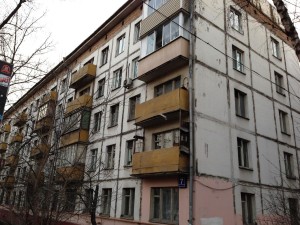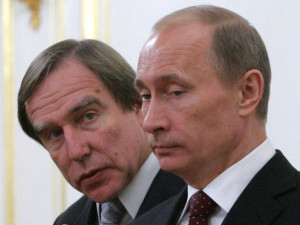
The widely known problems in Russia’s housing and communal services sector are not new. The entire sector is slowly but steadily deteriorating. This is no surprise since the average age of the Russian housing stock exceeds 40 years. Several tragedies happened over the last year. A residential building partially collapsed in Mezhdurechensk; household gas explosions occurred in Omsk, Perm, Yaroslavl and Volgograd; a bridge collapsed in Vladivostok; cars regularly get stuck in potholes as pavement collapses. Well-known Russian blogger Ilya Varlamov has repeatedly supplied evidence of dire housing conditions of ordinary Russians.
The federal authorities do not at all seem concerned about this situation. In 2016, federal allocations for the repair and replacement of utility lines as well as for the upgrading of the housing stock will amount to around 75 billion rubles or about half of the obviously ill-gotten $2 billion belonging to Putin’s close friend violinist Roldugin. There are plans to further cut federal spending on the housing and communal services sector in 2017 to more than half its 2016 amount.
In fact, why should Russia’s budget be spent on housing around 85 percent of which is privately owned? On the other hand, despite the mass privatization of apartments in the 1990s, public spaces and communal services of most apartment buildings such as entrance halls, courtyards, stairs, gas, electrical and plumbing have not been privatized and remain the responsibility of municipalities. The budget situation on the local level is obviously much worse than on the federal one.
The authorities try to shuffle off the burden of housing and communal services maintenance on the shoulders of apartment owners. In order to achieve this goal, they introduced a mandatory fee for repairs of the country’s housing stock. Out of almost 100 billion rubles that had been collected in 2015, according to Deputy Prime Minister Dmitri Kozak, only 25 billion were actually spent on repairs. The rest of the money was mainly absorbed by the banks authorized to collect the fee – Gazprombank that is controlled by Gazfond pension fund headed by Yuri Shamalov, the son of Putin’s friend and his son-in-law’s brother; and state-owned Rosselkhozbank with Dmitri Patrushev, the son of the secretary of Russia’s Security Council, as chairman of its management board. Such an icing on the cake!
Yet another problem has to do with those who carry out routine maintenance and repair work in the housing and communal services sector. Figures are being falsified, the work is being overpriced and, as a result of fraud schemes, payments for utility bills made through companies designated by state officials to act as intermediaries do not reach the actual suppliers of gas, electricity and water. Putin is well aware of the “non-transparency” of this industry but this does not change anything. The ever-growing debt to utilities’ suppliers has already reached 1 trillion rubles.
According to specialists, heat supply networks lack money even to repair damaged areas – let alone to carry out scheduled upgrades of heating systems. As a result, a general deterioration of heating systems is becoming increasingly noticeable. There is no doubt that preventive hot water shutdowns occurring on a regular basis – the practice that every Russian is so familiar with since childhood – will puzzle foreign guests for many years to come. The state of electricity supply systems appears to be just as deplorable. The equipment has been worn out more than halfway. As a result, the idea of imposing yet another mandatory fee on homeowners to maintain the country’s electric grid is being currently discussed. By the most conservative estimate, this will cost Russians 3 more billion rubles while electricity prices for the country’s population are rising faster than inflation and are already listed among the world’s highest.

Despite the fact that there are obvious solutions to the existing problems, prospects seem rather cheerless. Thus, instead of adopting active measures to prevent accidents and tragedies that might result in human casualties, the Russian Ministry of Construction, Housing and Utilities organizes a workshop for its staff on Russia’s housing and communal services sector to be held in Sochi, the country’s largest resort city. Naturally, in August.





